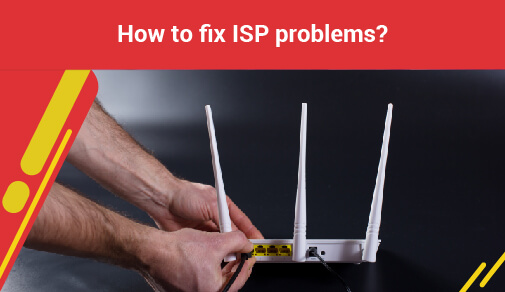How to fix isp problems?
-
567
-
17 Sep 2024
-
5 minutes

Are you experiencing ISP DNS issues with your internet connection? Having trouble streaming videos, loading websites, or staying connected to online games? It might be time to address your ISP problems. In this article, we will discuss who an ISP is, different types of internet connections, troubleshooting ISP issues, as well as steps on how to solve ISP issues. Let's dive in and get your internet back up and running smoothly by troubleshooting ISP issues.
Who is an ISP?
An ISP, or Internet Service Provider, is a company that provides individuals and businesses access to the internet. They offer various types of internet connections, such as DSL, cable, fiber-optic, and satellite internet. ISP's play a crucial role in delivering reliable and fast internet services to customers around the world.
Different Types of Internet Connections
1. DSL: DSL, or Digital Subscriber Line, uses existing telephone lines to deliver internet access. It is a popular choice for residential customers due to its availability and affordability.
2. Cable: Cable internet utilizes the same coaxial cables that are used for cable television. It offers higher speeds compared to DSL and is widely available in urban areas.
3. Fiber-Optic: Fiber-optic internet uses thin glass fibers to transmit data at incredibly high speeds. It is the fastest and most reliable type of internet connection, but it is not as widespread as DSL or cable.
4. Satellite: Satellite internet beams data from satellites in space to a dish on the ground. It is a viable option for rural areas where other types of internet connections are not available.
Identifying Common Issues and Solutions
One of the most common problems that users face with their ISP service provider is routing issues. This can result in slow internet speeds, dropped connections, or difficulty accessing certain websites. Here are some steps you can take to fix ISP routing problems:
1. Slow Internet Speeds: If you are experiencing slow speeds, try restarting your modem and router. You can also check for any background apps or devices consuming bandwidth and close them.
2. Intermittent Connection: If your internet keeps dropping out, make sure your cables are properly connected and not damaged. Resetting your modem and router can also help resolve this issue.
3. High Latency: If you are noticing delays in loading websites or playing online games, check for any network congestion or interference. Consider upgrading to a higher speed plan or switching to a different type of internet connection.
Steps to Fix It
1. Contact Your ISP service provider: If you have tried troubleshooting on your own and are still facing issues, reach out to your ISP for assistance. They may be able to diagnose the problem and provide a solution.
2. Check for Outages: Sometimes, internet issues are caused by outages in your area. Visit your ISP's website or social media channels to check for any reported outages.
3. Upgrade Your Equipment: If you have been using the same modem or router for several years, it may be time for an upgrade. Newer equipment can improve your internet speeds and reliability.
ISP DNS Issues
Another common problem that can affect your internet connection is DNS issues. DNS (Domain Name System) is responsible for translating domain names into IP addresses. If there are issues with your ISP's DNS servers, you may not be able to access certain websites. Here's how to fix ISP DNS problems:
1. Change Your DNS Settings: You can manually change your DNS settings to use a different DNS server. Google's Public DNS and OpenDNS are popular choices that you can use instead of your ISP's DNS servers.
2. Flush DNS Cache: Flushing your DNS cache can also help resolve DNS issues. Open a command prompt and type 'ipconfig / flushdns' to flush the DNS cache on your computer.
3. Update Your Router's Firmware: Sometimes, updating your router's firmware can help fix DNS issues. Check your router manufacturer's website for any available firmware updates.
How to solve ISP issues: Switch to ACT Fibernet
One of the most effective ways to fix ISP routing problems is to switch to one of the best ISP providers like ACT Fibernet. ACT Fibernet is known for its lightning-fast speeds, reliable connectivity, and top-notch customer service. By making the switch to ACT Fibernet, you can say goodbye to slow internet speeds and connectivity issues once and for all.
Benefits of switching to one of the best ISP providers: ACT Fibernet
1. Lightning-fast speeds: ACT Fibernet offers some of the fastest internet speeds in the market, ensuring smooth streaming, gaming, and browsing experiences.
2. Reliable connectivity: With ACT Fibernet, you can say goodbye to frequent disconnections and downtime, allowing you to stay connected at all times.
3. Excellent customer service: ACT Fibernet has a dedicated customer support team that is always ready to assist you with any queries or issues, ensuring a hassle-free experience.
How to make the switch
Switching to ACT Fibernet is a straightforward process that can be completed in a few simple steps. First, check if ACT Fibernet is available in your area and choose a suitable plan that meets your internet needs. Next, contact ACT Fibernet's customer service team to initiate the switch and schedule an installation appointment. Once the installation is complete, you can start enjoying the benefits of high-speed internet from ACT Fibernet.
In conclusion
Dealing with ISP problems can be frustrating, but there is a solution that can help you overcome these challenges. By switching to a reliable and efficient ISP like ACT Fibernet, you can enjoy lightning-fast speeds, reliable connectivity, and excellent customer service. So why settle for subpar internet service when you can make the switch to ACT Fibernet and experience seamless online connectivity? Make the smart choice today and say goodbye to ISP problems for good.






